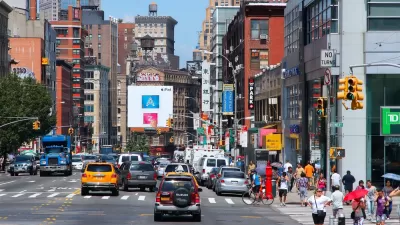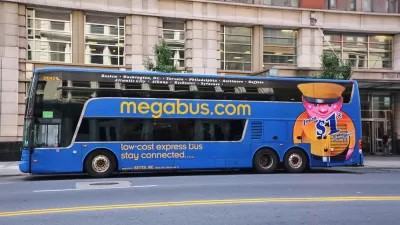Small, private bus-like jitneys have taken off in cities across North Jersey, operating more frequently and at lower cost than NJ Transit. Their reckless driving and skirting of regulations, however, present problems for transit planners.
In the past few years, a relatively new phenomenon seems to be taking hold in cities across North Jersey: the jitney. Similar to the dollar vans that ply the streets of Brooklyn and Queens, jitneys carry more than a taxi but less than a full-sized bus, and run semi-regular routes that often shadow city bus routes. But unlike the dollar vans of New York, the jitneys in North Jersey are legal and regulated (albeit lightly), and so in addition to local feeder service and circuits around New Jersey, they also run routes directly into Manhattan.
In terms of quality, the jitneys appear quite advanced – customers report that jitneys come more frequently than NJ Transit buses, and the price is lower (at least for individual tickets). The small bus size guarantees everybody a seat, and buses display stickers to indicate the presence of air conditioning.
Thanks to Stephen Smith
FULL STORY: North Jersey jitneys take off

Americans May Be Stuck — But Why?
Americans are moving a lot less than they once did, and that is a problem. While Yoni Applebaum, in his highly-publicized article Stuck, gets the reasons badly wrong, it's still important to ask: why are we moving so much less than before?

Study: Maui’s Plan to Convert Vacation Rentals to Long-Term Housing Could Cause Nearly $1 Billion Economic Loss
The plan would reduce visitor accommodation by 25,% resulting in 1,900 jobs lost.

Using Old Oil and Gas Wells for Green Energy Storage
Penn State researchers have found that repurposing abandoned oil and gas wells for geothermal-assisted compressed-air energy storage can boost efficiency, reduce environmental risks, and support clean energy and job transitions.

San Diego Swaps Parking Lane for Kid-Friendly Mini Park
The block-long greenway will feature interactive play equipment and landscaping.

Tracking the Invisible: Methane Leaks From LA’s Neighborhood Oil Sites
Environmental advocates are using infrared technology to monitor and document methane leaks from neighborhood oil sites, filling regulatory gaps and pushing for stronger protections to safeguard community health and the climate.

Montana Bill Promotes Parking Reform
A bill before the Montana state senate would bar cities from requiring more than one parking spot per new housing unit.
Urban Design for Planners 1: Software Tools
This six-course series explores essential urban design concepts using open source software and equips planners with the tools they need to participate fully in the urban design process.
Planning for Universal Design
Learn the tools for implementing Universal Design in planning regulations.
Caltrans
Heyer Gruel & Associates PA
Institute for Housing and Urban Development Studies (IHS)
City of Grandview
Harvard GSD Executive Education
Salt Lake City
NYU Wagner Graduate School of Public Service
City of Cambridge, Maryland





























